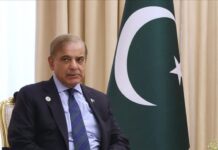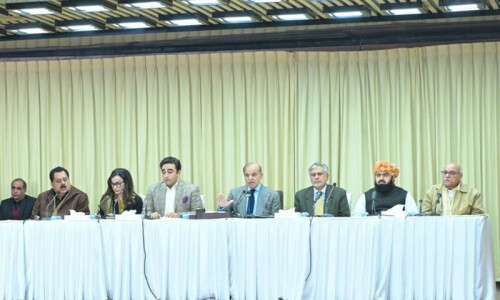ISLAMABAD: More than 90 percent of the pledges made at Monday’s Geneva Moot for flood relief in Pakistan have come in the form of project loans. A high-powered press conference that involved Prime Minister Shehbaz Sharif and other members of cabinet including Finance Minister Ishaq Dar revealed the details of the pledges made by different states and stakeholders at the specially called conference.
According to the finance minister, the project loans will be rolled out over the next three years. The presser revealed that $8.7 billion of the nearly $10 billion in pledges came in the form of project loans.
What are project loans?
As the name suggests, project loans are intended as financing for very particular initiatives for a set purpose.The money is dependent on compliance and is monitored to be used for a specific purpose. A country may, for example, assist another in the construction of a school or a hospital in a region. In this scenario, the funds help support the project. The funding may or may not originate from a single source.
In this particular case, the moot included generous contributions from the Islamic Development Bank, the Asian Development Bank, and friendly states including Saudi Arabia. Project finance is the funding (financing) of long-term infrastructure, industrial projects, and public services using a non-recourse or limited recourse financial structure.
Most of the loans are expected to be for infrastructure development. According to the latest report of the Post-Disaster Needs Assessment (PDNA), Pakistan needs at least $16.3 billion for post-flood rehabilitation and reconstruction. The PDNA report, released by the representatives of the government and the international development institutions, calculated the cost of floods at $30.1 billion – $14.9 billion in damages and $15.2 billion in losses.
Yet beyond this immediate need for reparations, Pakistan also needs a clear agenda on what it wants to do on the climate front. There is the immediate concern of rising temperatures, for example.Pakistan faces a problem where even if it is given the climate financing that it is asking for, it will not know how to spend this money effectively.
The Geneva Moot
The moot had been planned and called after last year’s COP27 conference at which Pakistan was centre stage owing to last year’s super floods that left the country deeply devastated and struggling to finance the recovery effort. The conference, which was co-hosted by the United Nations Secretary General Antonio Guterres and Prime Minister Shehbaz Sharif, was attended by heads of state, government representatives, and other stakeholders.
Details from the presser
While talking about the pledges Dar said project loan financing had already crossed $8bn, which included commitments from the Islamic Development Bank, the Asian Development Bank, the Asian Infrastructure Investment Bank, and the World Bank. These were some of the largest donations, the IDB pledging $4.2 billion while the ADB committed $2 billion.
“I am not incorporating the pledge made by the Saudi Development Bank on purpose here because it is not clear whether their announcement of $1bn pertains to programme lending or project loan,” Dar said. The finance minister did not reveal what the terms of these loans were. However, the prime minister said “we expect the terms to be lenient”.
“Be it bilateral or multinational donation, a sum of $9.7 billion is the total amount [that was pledged] and the Islamic Development Bank (ADB) held a major share of $4.2bn of the total financial commitments,” Prime Minister Shahbaz Sharif earlier said while talking about the outcome of donors’ conference.
Giving a breakdown of the amount pledged at the conference, the prime minister said Saudi Arabia committed $1 billion followed by China $100m, Qatar $25m, Canada $18.6m, Denmark $3.8m, European Union €87m, France €380m, Germany €84m, Italy €23m and Azerbaijan $2m.
The premier said the amount pledged by “friendly countries” showed respect for Pakistan, adding the countries would never have committed the amount had there been reservations over financial irregularities. “Those who hatched propaganda against the government have gotten the answer,” he said in an indirect reference to opponents of the coalition government.
Responding to a question on how soon he expects these pledges to turn into actual inflows, the premier said that depended on “us”. “The faster we can design and create feasibility and impress them [donors], the faster these pledges will materialise.”
IMF discussions continue
During the presser, the finance minister also talked about a meeting he had with the IMF team on the sidelines of the Geneva moot, revealing that discussions over the already delayed ninth review for the release of $1.2 billion revolved around the government’s ability to meet the revenue targets previously determined for the ongoing fiscal year after the Federal Board of Revenue fell short in December.
This gap in revenue collection was a result of a high court invalidating the super tax imposed by the government in June last year, according to the finance minister. He said that his team informed the IMF that Pakistan could recover the revenue shortfall in a staggered manner after the Supreme Court ruled on the super tax. “We are not changing the fiscal budget target and we will achieve it,” he asserted.
However, the IMF still wanted the government to take fiscal measures and cut back some subsidies, Dar added. “We have identified some fiscal measures but there will be no burden on the common man. They will be very targeted and categorical,” he assured.
Dar asked naysayers to stop spreading panic over “default” rumours, saying such elements must consider national interest above everything. He said Pakistan faces no threat of default and there is nothing to worry. “All the external debt liabilities will be made on time.”
At the outset of the presser, PM Shehbaz vowed that ‘every penny’ pledged by the international community for flood-relief work in Pakistan would transparently go to the victims. He also heaped praise on Foreign Minister Bilawal Bhutto Zardari for his efforts in meeting foreign dignitaries and raising “the case of Pakistan effectively”.


























Gitanjali Devi entrusts Simar Bhardwaj with the task of finding an ideal bride for her grandson. Simar’s quest ends when she meets her namesake, Simar Narayan, who dreams of making it big as a singer.